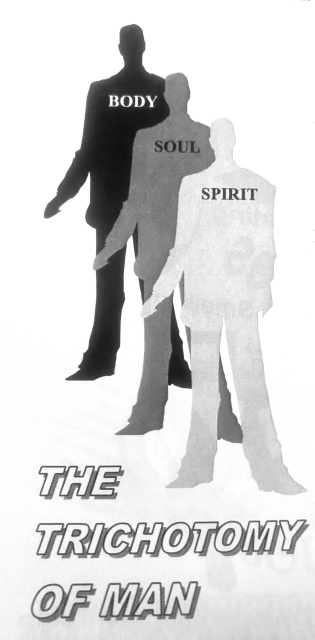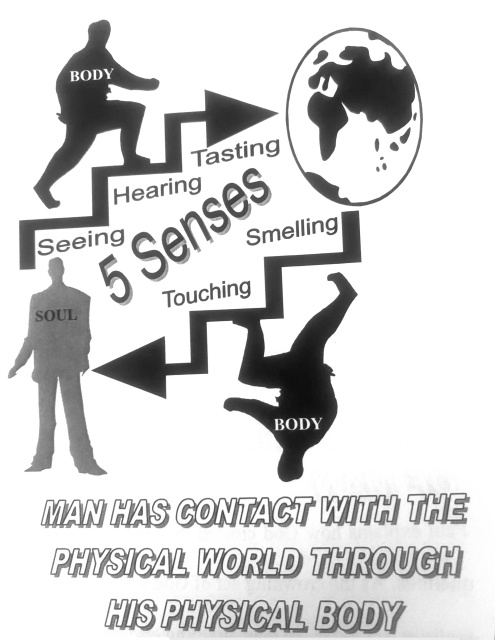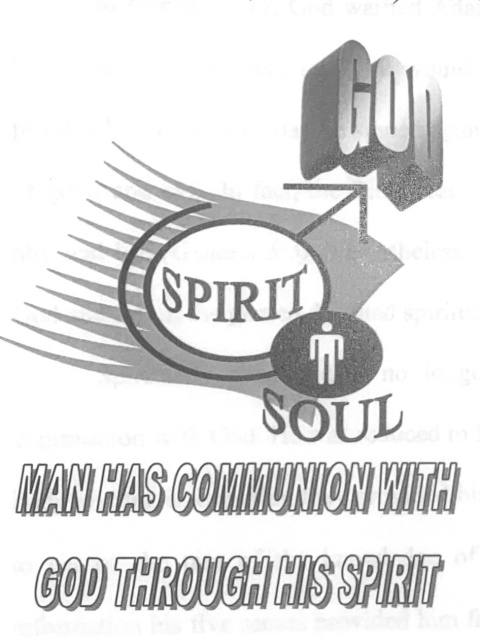 When God created man and breathed into his nostrils the breath of life, “man became a living soul” (Genesis 2:7). Man is a soul! This is why the Bible says, “He which converteth the sinner from the error of his way shall save a soul from death” (James 5:20). The soul is the real you. It is the seat of your personality. It is your mind, will and emotions.
When God created man and breathed into his nostrils the breath of life, “man became a living soul” (Genesis 2:7). Man is a soul! This is why the Bible says, “He which converteth the sinner from the error of his way shall save a soul from death” (James 5:20). The soul is the real you. It is the seat of your personality. It is your mind, will and emotions.
When God created man as a living soul He housed him in a physical body. God did this for two reasons. First, God gave man a physical body so that man could manifest God’s glory. God is invisible (Colossians 1:15; 1 Timothy 1:17, Hebrews 11:27). Thus, God created man with a physical body so that man could visibly display God’s glory. In Romans 1:20, the Apostle Paul explains how God created the visible world so that He could display His invisible qualities. As the crowning act of God’s creation, man displays and manifests the invisible qualities of God more than anything else that God has created.
The second reason God gave man a physical body was so that man could have contact and communion with the physical world. It is through your body, in particularly through your five senses, that you have contact with the physical world. Without your body your contact with the physical world would be severed, as is made unmistakably clear by physical death. When someone dies they lose all contact with the physical world, not because their soul ceases to exist, but because it is no longer clothed with a physical body. The physical body has perished and been put off by the soul.
 When God created man He not only housed him in a physical body, but He also placed within him, within the soul, a spirit. The spirit and soul are so intertwined that the Scripture often speaks of them interchangeably. In fact, the Bible teaches that only the “quick and powerful” Word of God, which is “sharper than any two-edged sword,” can pierce deep enough “to divide asunder soul and spirit” (Hebrews 4:12).
When God created man He not only housed him in a physical body, but He also placed within him, within the soul, a spirit. The spirit and soul are so intertwined that the Scripture often speaks of them interchangeably. In fact, the Bible teaches that only the “quick and powerful” Word of God, which is “sharper than any two-edged sword,” can pierce deep enough “to divide asunder soul and spirit” (Hebrews 4:12).
The reason God put a spirit within man was so that man could have contact with the spiritual world and communion with his Creator. Just as man has contact and communion with the physical world through his body, he has contact with the spiritual world and communion with God through his spirit. This is why the Psalmist said, “Deep calleth unto deep” (Psalm 42:7). God’s Spirit calls out to man’s spirit and the spirit deep within man calls out to God. It is spirit to spirit communication. As the Apostle Paul said, “The Spirit itself beareth witness with our spirit, that we are the children of God” (Romans 8:16).
When God created man man’s spirit, not his body, was dominant. Man lived in constant communion with God. He walked and talked with God in the garden in the cool of the day (Genesis 3:8). Walking and talking with God enabled man to live his life by the information he received from God through his spirit. Man lived, as he was created to, “by every word that proceeded out of the mouth of God” (Matthew 4:4).
 God created man as a spiritual being with a physical body, not as a physical being with a spirit. This is part of what the Bible means when it teaches us that we are created in the image of God (Genesis 1:26). Like God, you and I are spiritual beings.
God created man as a spiritual being with a physical body, not as a physical being with a spirit. This is part of what the Bible means when it teaches us that we are created in the image of God (Genesis 1:26). Like God, you and I are spiritual beings.
Not only did God make us in His image by creating us as spiritual beings, but also by creating us as triune beings. God is a trinity. There is God the Father, God the Son and God the Holy Spirit. All three are different; yet, all three are one. Likewise, man is a triune being (1 Thessalonians 5:23). We are soul, body and spirit. All three are different; yet, all three are one.
In Genesis 1:26, God says, “Let us make man in our image, after our likeness.” Notice, God does not say, “I will make man in my image, after my likeness.” The plural pronouns employed by God in this verse point to the Trinity. God made us triune like Himself. Our soul corresponds with God the Father. Our body corresponds with God the Son, who was “made flesh and dwelt among us” (John 1:14). And our spirit corresponds with God the Holy Spirit. No wonder King David exclaimed, “I will praise thee; for I am fearfully and wonderfully made” (Psalm 139:14).